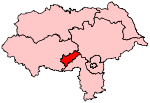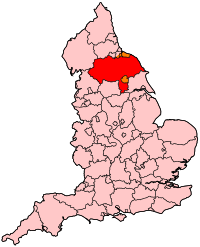Harrogate and Knaresborough (UK Parliament constituency)
Harrogate and Knaresborough (/ˈhærəɡət ... ˈnɛərzbərə, -ɡeɪt-, -bru/)[2][3] is a parliamentary constituency in North Yorkshire which has been represented in the House of Commons of the UK Parliament since 2010 by Andrew Jones, an MP from the Conservative Party. The constituency was first contested at the 1997 general election, and is in an affluent part of Yorkshire, historically being a Conservative-Liberal Democrat marginal seat.
| Harrogate and Knaresborough | |
|---|---|
| Borough constituency for the House of Commons | |
 Boundary of Harrogate and Knaresborough in North Yorkshire for the 2010 general election | |
 Location of North Yorkshire within England | |
| County | North Yorkshire |
| Electorate | 76,777 (December 2019)[1] |
| Major settlements | Harrogate and Knaresborough |
| Current constituency | |
| Created | 1997 |
| Member of Parliament | Andrew Jones (Conservative) |
| Number of members | One |
| Created from | Harrogate constituency |
Constituency profile
An area with little unemployment, a relatively large retired population and large neighbourhoods of high house prices[n 1][4] the former Harrogate constituency was a safe Conservative seat. When former Chancellor Norman Lamont stood for the Harrogate and Knaresborough seat in the Labour landslide general election in 1997, Harrogate moved the way of other spa towns in England such as Bath, and more urban and less touristic Cheltenham, by returning a non-Conservative candidate. The Liberal Democrat MP Phil Willis was elected, and served until Andrew Jones regained the seat for his party on Willis's retirement in the 2010 general election with a swing of 9.1% and a margin of 1,039 votes.[5]
Boundaries
1997–2010: The Borough of Harrogate wards of Bilton, Duchy, East Central, Granby, Harlow, Knaresborough East, Knaresborough West, New Park, Pannal, Starbeck, Wedderburn, and West Central.
2010–present: The Borough of Harrogate wards of Bilton, Boroughbridge, Claro, Granby, Harlow Moor, High Harrogate, Hookstone, Killinghall, Knaresborough East, Knaresborough King James, Knaresborough Scriven Park, Low Harrogate, New Park, Pannal, Rossett, Saltergate, Starbeck, Stray, and Woodfield.
The constituency is centred on the towns of Harrogate and Knaresborough, with no parts more than 10 miles (16 km) away from either.
History
Before 1950 the two eponymous towns had been part of the Ripon constituency. The constituency was created as Harrogate and following boundary changes in 1997 the name was changed to 'Harrogate and Knaresborough'.
The current constituency embraces three former borough constituencies: Aldborough (now a suburb of Boroughbridge civil parish) and Boroughbridge, which were abolished as 'rotten boroughs' by the Great Reform Act, 1832, and Knaresborough, abolished 1885.
Members of Parliament
| Election | Member[6] | Party | |
|---|---|---|---|
| 1997 | Phil Willis | Liberal Democrat | |
| 2010 | Andrew Jones | Conservative | |
Elections
Elections in the 2010s
| Party | Candidate | Votes | % | ± | |
|---|---|---|---|---|---|
| Conservative | Andrew Jones | 29,962 | 52.6 | -2.9 | |
| Liberal Democrats | Judith Rogerson | 20,287 | 35.6 | +12.2 | |
| Labour | Mark Sewards | 5,480 | 9.6 | -10.5 | |
| Yorkshire Party | Kieron George | 1,208 | 2.1 | N/A | |
| Majority | 9,675 | 17.0 | -15.0 | ||
| Turnout | 56,937 | 73.1 | +0.1 | ||
| Conservative hold | Swing | -7.6 | |||
| Party | Candidate | Votes | % | ± | |
|---|---|---|---|---|---|
| Conservative | Andrew Jones | 31,477 | 55.5 | +2.7 | |
| Liberal Democrats | Helen Flynn | 13,309 | 23.5 | +1.4 | |
| Labour | Mark Sewards | 11,395 | 20.1 | +9.9 | |
| Independent | Donald Fraser | 559 | 1.0 | N/A | |
| Majority | 18,168 | 32.0 | +1.3 | ||
| Turnout | 56,907 | 73.0 | +4.5 | ||
| Conservative hold | Swing | +0.67 | |||
| Party | Candidate | Votes | % | ± | |
|---|---|---|---|---|---|
| Conservative | Andrew Jones | 28,153 | 52.7 | +7.0 | |
| Liberal Democrats | Helen Flynn | 11,782 | 22.1 | -21.7 | |
| UKIP | David Simister | 5,681 | 10.6 | +8.7 | |
| Labour | Jan Williams | 5,409 | 10.1 | +3.7 | |
| Green | Shan Oakes | 2,351 | 4.4 | N/A | |
| Majority | 16,371 | 30.7 | +28.7 | ||
| Turnout | 53,376 | 69.0 | -1.6 | ||
| Conservative hold | Swing | +14.4 | |||
| Party | Candidate | Votes | % | ± | |
|---|---|---|---|---|---|
| Conservative | Andrew Jones | 24,305 | 45.7 | +9.8 | |
| Liberal Democrats | Claire Kelley | 23,266 | 43.8 | -8.4 | |
| Labour | Kevin McNerney | 3,413 | 6.4 | -2.7 | |
| BNP | Steve Gill | 1,094 | 2.1 | +1.1 | |
| UKIP | John Upex | 1,056 | 2.0 | +0.3 | |
| Majority | 1,039 | 2.0 | N/A | ||
| Turnout | 53,134 | 70.6 | +3.9 | ||
| Conservative gain from Liberal Democrats | Swing | 9.1 | |||
Elections in the 2000s
| Party | Candidate | Votes | % | ± | |
|---|---|---|---|---|---|
| Liberal Democrats | Phil Willis | 24,113 | 56.3 | +0.7 | |
| Conservative | Maggie Punyer | 13,684 | 31.9 | -2.7 | |
| Labour | Lorraine Ferris | 3,627 | 8.5 | +1.1 | |
| UKIP | Chris Royston | 845 | 2.0 | +0.2 | |
| BNP | Colin Banner | 466 | 1.1 | N/A | |
| Alliance For Change | John Allman | 123 | 0.3 | N/A | |
| Majority | 10,429 | 24.3 | |||
| Turnout | 42,858 | 65.3 | +0.7 | ||
| Liberal Democrats hold | Swing | ||||
| Party | Candidate | Votes | % | ± | |
|---|---|---|---|---|---|
| Liberal Democrats | Phil Willis | 23,445 | 55.6 | +4.0 | |
| Conservative | Andrew Jones | 14,600 | 34.6 | -3.8 | |
| Labour | Alastair MacDonald | 3,101 | 7.4 | -1.4 | |
| UKIP | Bill Brown | 761 | 1.8 | N/A | |
| ProLife Alliance | John Cornforth | 272 | 0.6 | N/A | |
| Majority | 8,845 | 21.0 | |||
| Turnout | 42,179 | 64.6 | -8.2 | ||
| Liberal Democrats hold | Swing | ||||
Elections in the 1990s
| Party | Candidate | Votes | % | ± | |
|---|---|---|---|---|---|
| Liberal Democrats | Phil Willis | 24,558 | 51.5 | +18.2 | |
| Conservative | Norman Lamont | 18,322 | 38.5 | −13.3 | |
| Labour | Barbara Boyce | 4,151 | 8.7 | −4.8 | |
| Loyal Conservative | John Blackburn | 614 | 1.3 | +1.3 | |
| Majority | 6,236 | 13.0 | N/A | ||
| Turnout | 47,645 | 73.1 | N/A | ||
| Liberal Democrats gain from Conservative | Swing | ||||
Notes and references
- Notes
- In the 2001 census: worklessness was the status of (see Harrogate 009 Middle Layer SOA for access to the whole district): 1.0% of working age people compared to Yorkshire and the Humber: 2.6% England 2.3%
However, in the 2001 Census publication "Indices of Deprivation and Classification: Social Grade" 0.27% of the wider District population of 69,614 of working age were Class E: On state benefit, unemployed, lowest grade workers, slightly higher than 0.22% Yorkshire and the Humber average and 0.24% national average
- References
- "Constituency data: electorates – House of Commons Library". Parliament UK. 15 June 2020. Retrieved 22 July 2020.
- "Harrogate". Dictionary.com Unabridged. Random House. Retrieved 22 January 2016.
- "Harrogate". Merriam-Webster Dictionary. Retrieved 22 January 2016.
- "Property for Sale in Harrogate, North Yorkshire - Mouseprice". www.mouseprice.com.
- "Harrogate and Knaresborough: Blow to Lib Dems as close-run race ends in loss". Yorkshire Post. Johnston Press Digital Publishing. 10 May 2010. Retrieved 15 May 2010.
- Leigh Rayment's Historical List of MPs – Constituencies beginning with "H" (part 1)
- "Harrogate & Knaresborough Parliamentary constituency". BBC News. BBC. Retrieved 4 December 2019.
- "Harrogate & Knaresborough parliamentary constituency". BBC News.
- "Election Data 2015". Electoral Calculus. Archived from the original on 17 October 2015. Retrieved 17 October 2015.
- "Harrogate & Knaresborough". BBC News. Retrieved 13 May 2015.
- "Election Data 2010". Electoral Calculus. Archived from the original on 26 July 2013. Retrieved 17 October 2015.
- "UK > England > Yorkshire & the Humber > Harrogate & Knaresborough". Election 2010. BBC. 7 May 2010. Retrieved 10 May 2010.
- "Election Data 2005". Electoral Calculus. Archived from the original on 15 October 2011. Retrieved 18 October 2015.
- "Election Data 2001". Electoral Calculus. Archived from the original on 15 October 2011. Retrieved 18 October 2015.
- "Election Data 1997". Electoral Calculus. Archived from the original on 15 October 2011. Retrieved 18 October 2015.